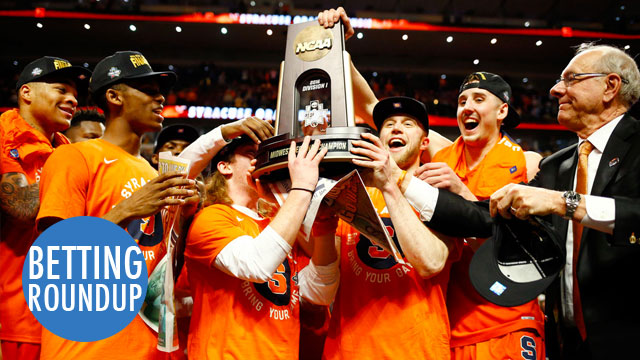Twice weekly, we’ll comb through as many articles, tweets and podcasts as we can find related to the world of sports betting and daily fantasy sports, and publish the good stuff here.
Stumble upon something you think we should include? Email info@bettingtalk.com.
* * *
Syracuse earned an unlikely trip to the Final Four after rallying from a 16-point deficit to Virginia (which closed as an eight-point favorite) in their Elite Eight matchup on Sunday. A handful of Las Vegas bettors could have a big payday if Syracuse cuts down the nets next Monday.
On Jan. 13, the Westgate SuperBook had Syracuse listed at 1,000-1 to win the NCAA tournament. Even though the Orange were struggling at that point, some folks had faith. The Westgate booked four bets, totaling $135, at that price, including a $100 ticket that would pay $100,100.
Jay Kornegay, vice president of race and sports for Westgate Las Vegas SuperBook, said the SuperBook took four bets at 1000-1 in mid-January for Syracuse to win the national championship. Should Syracuse go on to win it all, it would be the highest odds ever paid out by the SuperBook. The current record is a 500-1 payout in 2011 when NASCAR driver Regan Smith won at Darlington Raceway.
The Las Vegas Review Journal has more sports betting nuggets from this past weekend’s NCAA tournament results.
“It’s just a crazy year. It’s absolutely nuts,” William Hill sports book director Nick Bogdanovich said. “Any one of these teams can go down.”
The Polk County (Fla.) Sheriff’s Office arrested 25 people (including a bus driver) for illegal sports betting during a sting operation at a check cashing service office.
After detectives served the search warrants to the two illegal gambling locations, Wood said, they operated a reverse-sting as gamblers came to the locations to collect on previous bets made or to place new bets.
During this time detectives arrested another 19 people for unlawful betting, a misdemeanor, and other miscellaneous charges, reports said.
In Kenya, sports betting is the fastest growing industry. A Kenyan reporter just completed a three-part series on the country’s sports betting craze.
Legal Sports Report debunks myths about daily fantasy sports regulation.
‘Casinos want to ban daily fantasy sports’
Truth-o-meter: Commercial casinos, not so much; tribal casinos, maybe.‘States see DFS as a way to fill the coffers’
Truth-o-meter: Nope, although some lawmakers have an inflated sense of DFS revenue.
A new radar tracking system called Statcast that was shown off at the SABR Analytics meeting could bring on a new age of sabermetrics to baseball.
And the game’s newest methods of collecting information, including such diverse offerings as the radar tracking system Statcast and neurological monitoring, have the potential to upend a number of sabermetric truths we once thought settled.
Judging from the long shadow it cast at the conference, Statcast might be the chief disruptor of Sabermetrics 1.0. Daren Willman of MLB Advanced Media and Mike Petriello of MLB.com demonstrated the power of the system to monitor factors as varied as the spin on Jake Arrieta’s curveball and Kevin Kiermaier’s defensive range. Sabermetric evaluations of defense, in particular, may benefit greatly from Statcast, as analysts will be able to more precisely measure all aspects of defensive play — from a fielder’s first step to his maximum range and the velocity of his throws.
For example, during the first wave of sabermetric defensive measurements, shifts especially confounded our ability to home in on a player’s true fielding skill. Statcast addresses that flaw by measuring the positioning of every fielder before each pitch, and when that information eventually becomes public1 it will undoubtedly reshape our defensive metrics.
A Delta employee was arrested with more than $282,000 cash in his backpack and said the money “did not come from a good cause.”
He then proceeded to tell investigators that he was being paid up to $1,000 to give the backpack to an unknown person in a bathroom inside the airport’s sterile area, the complaint said. He’d allegedly done such drop-offs before for about a year, earning close to $4,000 for his work.Selius only knew the men who paid him as “Ricky” and “John,” but admitted he knew the backpack contained a large amount of money that did not “come from a good cause,” the complaint said.
